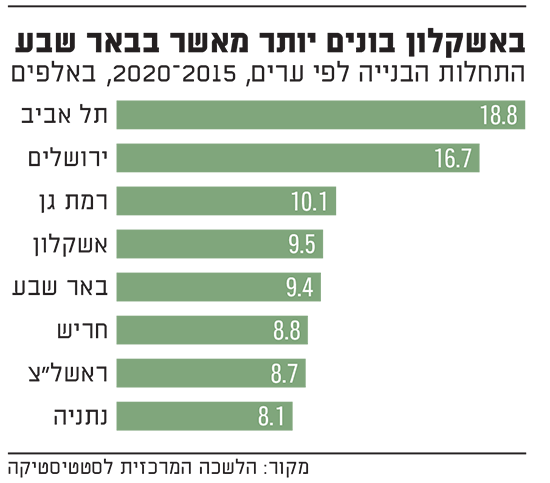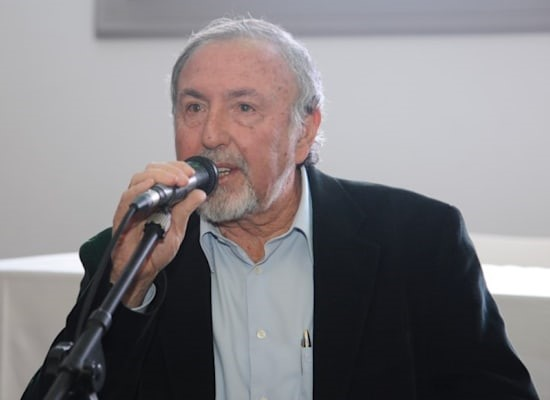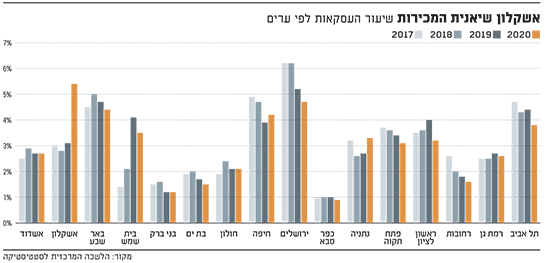Globes, Arik Mirowski, 06.04.2021
Not Tel Aviv, not Jerusalem, not Beer Sheva. Meet the undisputed real estate queen of 2020: Ashkelon. One in 20 deals made in Israel last year was in the southern coastal city; one in every 20 apartments that began construction last year was - right. In Ashkelon. Was no factor used in the real estate market, for this senior class?
The nature of the Israeli market must first be understood: almost half of the transactions for apartments are made in the 16 largest cities, and here the familiar concept of "demand areas" fades, since among the prominent cities for buying apartments are peripheral cities and cities not included in the central region. "Demand areas". This is probably due to the large involvement of investors in some of these places.

Between 2017 and 2018, Jerusalem was the city with the largest number of transactions according to CBS data, with 4,000-4,500 transactions made each year. These data are not absolute, as not all transactions are included in the bureau's calculations, but they give us a reliable estimate. Regarding the size of the market, in these two years, about 6% of all transactions made in the country were made in the capital.
Haifa, which is not identified with areas of demand but is highly identified with investors, came in second. In these two years, almost 5% of all transactions made in Haifa were made in Haifa; In Be'er Sheva, too, a large number of transactions were recorded - 4.5% - 5% of all transactions, while Tel Aviv came in only fourth place in the number of transactions, about 4.5%. Ashkelon lagged far behind in those years with about 3% of transactions.
In 2020, however, things changed. In Jerusalem, Tel Aviv, Haifa and Beer Sheva, the number of transactions decreased, while in Ashkelon it jumped to 4,200, which placed it first in the country in terms of number of transactions.
Demand is also evident in the increase in prices: while in the whole country the average price increased by 4.3%, in Ashkelon according to the CBS it increased by 6%. But even after this increase, the average price of an apartment in Ashkelon in the fourth quarter of 2020 was NIS 1.2 million - Compared with a national average of NIS 1.6 million.
Despite its natural data - a coastal city that is about 50 km from Tel Aviv, Ashkelon has not stood out in the local real estate market until recent years. Most of the time it was known as a city of relatively low socio-economic status, and despite its data was not considered a tourist city.
More than 20 years ago, the municipal marina was established, and it was also accompanied by the construction of holiday apartment projects that were in demand among foreign residents. These were looking for properties on the sea that would be cheaper than in the more northern marinas, of Herzliya and Ashdod. Despite this, by the end of the first decade of the present century, the volume of construction in the city did not exceed a few hundred of housing units per year.
After the sharp price increases of 2009-2010, governments began to initiate massive land thawing in order to prevent the price increase. This is where Ashkelon's great advantage is reflected, and that is the large number of state lands in its municipal territory, which enabled the state to focus on large construction in the city. Indeed, since 2010 the city's place has not been absent from the top of construction in Israel. In examining the construction starts made in the various cities between 2015 and 2020, Ashkelon is in fourth place in terms of construction. And where there are extensive construction volumes there are also large transaction volumes.
Thanks to the price per occupant
"All the surge in construction in the city and in the number of transactions can be attributed to a price per occupant," says the chairman of the Ashkelon Contractors Association, David Rosner. You arrive in Tel Aviv by train in half an hour. "

David Rosner, Chairman of the Association of Contractors and Builders in Ashkelon / Photo: Thomas PR
Indeed, when Moshe Kahlon began implementing the umbrella agreement procedure (originally by his predecessor as finance minister, Yair Lapid), Ashkelon was the target of one of the largest agreements, according to which 31,000 new housing units were designated for the city, most of which are included in plans for preferred complexes. About a third of them were designated for the northeastern part of the city, called the "Wine City" and planned through a plan for preferred housing complexes (TAML) for about 12,000 housing units.
There are currently about 2,300 apartments under active construction in the neighborhood. Another prominent neighborhood that has been active in recent years is the Barnea neighborhood, located in the northwest of the city, where there are about 1,500 apartments under active construction; And a prominent third neighborhood is the Lakes neighborhood located on the south side of the city, where about 700 housing units are currently being built.
As Rosner said, Ashkelon stars in the price per occupant, with about 7,000 discounted apartments that were drawn in about 150 projects under the program. To these apartments were added thousands of additional apartments sold in the same projects as part of the free market. The price of a 5-room apartment in the city, according to the CBS, is about NIS 1.6 million, which is considered one of the lowest prices among the big cities.
Mayor Tomer Glam adds that Ashkelon enjoys attractiveness among families and young couples thanks to natural data, such as proximity to the center, a coastal city and resort with the longest coastline in Israel and extensive green spaces, noting that the city is undergoing accelerated development in all walks of life.

Tomer Glam, Mayor of Ashkelon / Photo: Ruben Kapuchinsky
"In recent years, we have implemented a number of projects that made Ashkelon attractive. The new Ashkelon North Interchange, which was inaugurated several months ago, significantly shortens the trip to the center and with the establishment of a high-tech park, which is in advanced marketing stages, Ashkelon will become a major player in knowledge-intensive industries." To the residents of the city.
"The city is nominated for the national education award and the field of education has undergone a revolution, the residential property tax is one of the cheapest in Israel, we won first place in the beauty pageant of the Beautiful Israel Council and in the coming years it will become an important and central metropolis in Israel," says Glam.
A jump in the number of residents
However, accelerated construction has resulted in the city's population growing by about a quarter in the last decade (144,000 people in 2019), a not-so-simple challenge for any locality, let alone a city that is not rich. Rosner fears the day when much construction will be translated into thousands of new families who will have to receive services from the municipality. "We have not yet reached a situation where the garbage has to be removed from these neighborhoods, and the municipality will have to prepare for this day."

"Making a career in networking" - the campaign that celebrates the spirit of the period
Glam says he is considering the new plans will double the city's population. "We are developing advanced transportation infrastructure, producing quality jobs, construction will be smarter, we are already revolutionizing the coastal strip and promenade, we will build shopping centers, recreation and leisure, we will invest more in cleaning, gardening and environmental care."
He also promises a revolution in everything related to urban renewal: "The old neighborhoods in Ashkelon, which have not been touched for more than 50 years, are going to change their face with the progress of construction clearance projects and NAP 38, projects that will do real social justice to our old residents."
All of these, however, require a lot of budgets and close government assistance, and Glam says he is working tirelessly to get more government budgets. "In the past year, we received about NIS 300 million after a struggle I had for aid to the city of Ashkelon.
In addition, in the past year the city of Ashkelon has been defined, for the first time in its history, as a national priority area for employment, industry and commerce and as Development Area A for industrial areas which will help us encourage leading companies and entrepreneurs to come to the city. Companies like Electra-Bush, Siemens are already setting up their factories in the city and other companies like Multi-bolt are expanding their operations in the city.



